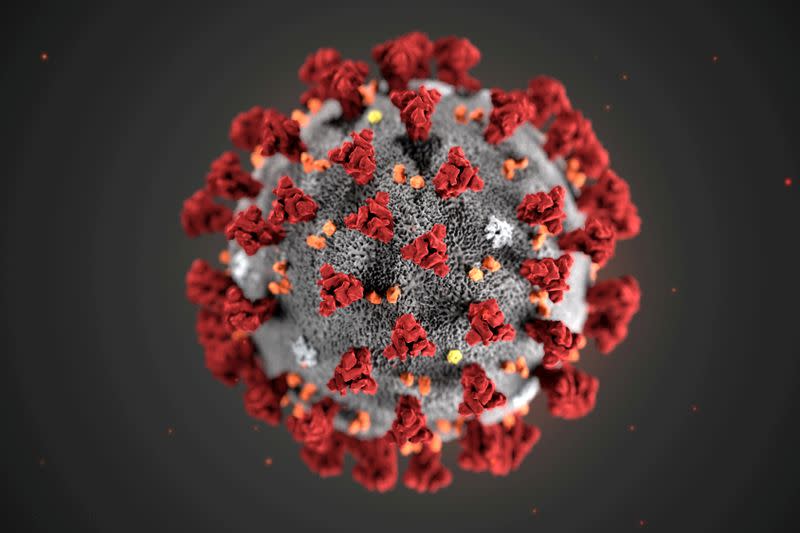By Nancy Lapid
(Reuters) – The following is a summary of some of the latest scientific studies on the new coronavirus and efforts to find treatments and vaccines for COVID-19, the disease caused by the virus.
Intestinal bacteria linked to COVID-19 gravity, immune response
The microscopic organisms that live in our intestines can influence the severity of COVID-19 and the body’s immune response to it, and can be responsible for persistent symptoms, the researchers reported on Monday in the journal Gut. They found that intestinal microorganisms in patients with COVID-19 were very different from those in uninfected individuals. “Patients with COVID do not have certain good bacteria known to regulate our immune systems,” said Dr. Siew Ng, of the Chinese University in Hong Kong. The presence of an abnormal variety of intestinal bacteria, or “dysbiosis”, persists after the virus has disappeared and may play a role in the long-term symptoms that affect some patients, she said. His team developed an oral formula of live bacteria known as probiotics and a special capsule to protect organisms until they reach the intestine. “Compared to standard treatment patients, our pilot clinical study showed that more COVID patients who received our microbial immunity formula achieved complete resolution of symptoms,” said Ng, adding that those who received it had significantly reduced markers of inflammation in their blood, favorable bacteria increase in your stool and developed neutralizing antibodies to the virus. (https://bit.ly/3q9u1hb)
Pandemic affects the mental health of ICU workers
Nearly half of employees working in intensive care units (ICUs) in England have severe anxiety, depression or post-traumatic stress disorder, with some feeling that they are better off dead, researchers reported on Wednesday in Occupational Medicine. The study was conducted in June and July – before Britain started experiencing its latest increase in hospitalizations. Among more than 700 health professionals in nine ICUs, 45% reached the limit of probable clinical significance for at least one of the four serious mental disorders: severe depression (6%), PTSD (40%), severe anxiety (11%) or drinking problem (7%). More than one in eight reported frequent suicidal or self-harm thoughts in the previous two weeks. Poor mental health among ICU staff who care for seriously ill and dying COVID-19 patients not only impairs their quality of life, but also likely impairs their ability to work effectively, the researchers said. The results show an urgent need for readily accessible mental health services for all health professionals. (https://bit.ly/2LN5SOQ; https://reut.rs/38GlzAn)
Cooling jackets help COVID-19 nurses to tolerate PPE
Nurses in COVID-19 wards who wear cooling vests under their personal protective equipment (PPE) feel less overwhelmed by the heat during their shifts, suggests a small study. Seventeen nurses wore a light cooling vest under the PPE one day, and the PPE only the other day. On both days, participants swallowed an electronic capsule that provides a continuous reading of central body temperature. The vests led to a slight improvement in body temperature, but a much greater improvement in the feeling of being very hot, the researchers reported in the journal Temperature. Only 18% of nurses reported thermal discomfort and 35% a slightly warm thermal sensation at the end of the day with the vest. That against 81% and 94%, respectively, on the day without a vest. “PPE is known to induce heat stress, which increases fatigue and sensory displeasure, and is known to impair effective decision-making,” said study co-author Thijs Eijsvogels of the Radboud University Medical Center in the Netherlands . CoolOver vests made by the Dutch company Inuteq are easy to disinfect and reactivate in a refrigerator, he said, and can extend work tolerance and improve the recovery of doctors involved in COVID-19 treatment. (https://bit.ly/2K9sXe5)
Diabetes increases COVID-19 risks for black patients
Black patients with type 1 diabetes (T1D) who have been infected with the new coronavirus face a particularly high risk of a life-threatening complication of diabetes known as ketoacidosis, new data show. T1D usually develops in children or young adults and requires daily insulin to survive. The researchers studied 180 patients in the United States with T1D and COVID-19, including 31% who were black and 26% who were Hispanic. Black patients were almost four times more likely to develop diabetic ketoacidosis (DKA) compared to white patients, the researchers reported in The Journal of Clinical Endocrinology and Metabolism. Hispanics had a slightly higher risk than white patients. Blacks and Hispanics were significantly less likely to use new diabetes technologies, such as continuous glucose monitoring and insulin pumps, and had significantly worse blood sugar control compared to white patients. This suggests that the higher risk was probably driven by structural and systemic inequality, co-author Dr. Osagie Ebekozien of the nonprofit T1D Exchange in Boston told Reuters. Particularly during the pandemic, healthcare professionals need to screen patients with DM1 for socioeconomic factors that increase the risk of CAD, such as food insecurity, affordable insulin prices and access to diabetes supplies, the researchers said. (http://bit.ly/3hWJZs8)
Open https://tmsnrt.rs/3a5EyDh in an external browser to see a Reuters graph of vaccines and treatments under development.
(Reporting by Nancy Lapid and Megan Brooks; Editing by Bill Berkrot)
